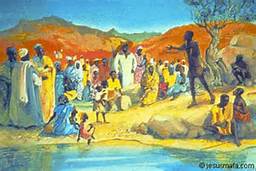“The Waters of Baptism”

Mark 1:4-11 (1:9) – January 10, 2021
When you or I think of baptism today, what comes to mind? A family with a precious infant or young child, the little one dressed in a special outfit. The congregation rejoicing as the minister performs the sacrament. Such a special and meaningful way of extending God’s grace.
But, let’s go back to our Gospel reading, when John the Baptist preached repentance. Certainly quite a different scene comes to mind. We see John as an outsider, some say a preacher of doom and gloom, and others a mighty prophet of God.
Reading from the Gospel for today, “John the Baptist appeared in the wilderness, preaching a baptism of repentance for the forgiveness of sins. 5 The whole Judean countryside and all the people of Jerusalem went out to him. Confessing their sins, they were baptized by him in the Jordan River.”
You may remember bracelets and t-shirts with the initials “WWJD” imprinted on them. The words “What Would Jesus Do?” were a Christian, and even pop-culture, trend some years ago. Remembering this trend brings up a valid question. Let’s reframe it into a question about baptism. Who would Jesus exclude? For that matter, who would John turn away from baptism?
I’d like to develop that question. St. Luke’s Church, our church, is a member church of the United Churches of Christ. This denomination has taken the radical stand of radical welcome. UCC churches are supposed to welcome everyone. That means a radical, open-hearted, open-handed welcome to all people, no matter what. No matter who.
No matter if someone is grumpy, or mean, or stingy. You are welcome here at St. Luke’s Church. No matter if someone is painfully shy, or has some physical or mental infirmity, or has a really strong personality. No matter what your gender or sexual orientation is, either. All are welcome here, in this particular church, too.
As we ask “Who Would Jesus Exclude?” from membership in this church, this brings to mind what the Rev. Dr. David Handley often proclaimed from the pulpit in his long tenure at First Presbyterian Church of Evanston. I remember hearing when I was a member there some 15 and 20 years ago. Dr. Handley would often insist in his sermons that the church is not a private club for the righteous, but instead a hospital for sinners.
I mean to say that our church is not to have arbitrary, unspoken rules for who to include and who to exclude from membership. God does not discriminate. God does not blackball prospective members. The UCC has taken the stand of radical welcome to everyone. That means that as a member church of the UCC, St. Luke’s Church takes that stand, too.
I would like to return to our Gospel reading for this morning. Can you imagine John the Baptist saying, “I’m not baptizing that person!” because John didn’t like him or her? Sure, John had a strong personality. John was headstrong, and determined, and definitely spoke his mind. Many of the Jewish leaders and bigwigs in the Sanhedrin were upset with John the Baptist.
However, I suspect many of the ordinary members of synagogues throughout the region heard John’s message. Some people who had been turned away from synagogues, too. John the Baptist extended that radical welcome – telling all to repent of their sins, get right with God, and come and be baptized as an outward expression of an inward change.
Even some Jewish leaders and synagogue bigwigs heard John’s preaching, and were convicted of their small-minded and biased point of view. Even people John knew who had bad-mouthed and shunned him. I am sure John did not turn them away, but baptized them, too.
Do you think God was surprised about the conflict in synagogues, and at the Temple? How about the conflict in the early churches? What do you think Paul and Peter, James and John were addressing when they wrote their letters that are included in the New Testament? Sins like hatred, conflict, bitterness and envy do not somehow “scare” God.
Just as in this past week here in the United States, the heightened rhetoric and the storming of the Capitol building did not shock God. God was not surprised or scared of the massive conflict and disruption. God recognizes that people are human. People sin – that is what they do. That is why John the Baptist came, to make people aware of their sin, and to call people to repentance. Baptism lets everyone know about people’s individual, internal change.
This church baptizes infants and small children. As commentator Carolyn Brown says, Infants and children “didn’t even know what was going on; [and] God, their parents, and the congregation loved them and claimed them as their own for all time.” [1] That can be extended to ALL of us. We all have been loved and claimed by God for all time. We are all God’s beloved.
The waters of baptism are here to wash away our sin, in this day and age. And not only that, but to extend God’s grace to those who have gone through the baptismal waters. Yes, we continue to sin, and yes, God does extend grace. We do not become suddenly sin-less, but as we walk with God, we will sin less and less. (At least, that is the hope.)
I say to you, in the spirit of John the Baptist, Repent, and remember your baptism! Determine to journey with Jesus from this point onwards. Alleluia, amen.
[1] http://worshipingwithchildren.blogspot.com/2014/12/year-b-baptism-of-lord-first-sunday.html
Worshiping with Children, Baptism of the Lord, Including children in the congregation’s worship, using the Revised Common Lectionary, Carolyn C. Brown, 2015.
(Suggestion: visit me at my other blogs: matterofprayer: A Year of Everyday Prayers. #PursuePEACE – and A Year of Being Kind . Thanks!

